BMR Calculator
Enter Your Details (US Units)
Enter Your Details (Metric Units)
Your Results
Basal Metabolic Rate (BMR)
Daily Calorie Needs by Activity Level
| Activity Level | Calories/Day |
|---|---|
| Sedentary ?Little or no exercise, desk job, mostly sitting. | |
| Lightly Active ?Light exercise or sports 1-3 days/week. | |
| Moderately Active ?Moderate exercise or sports 4-5 days/week. | |
| Very Active ?Hard exercise or sports daily, or intense exercise 3-4 days/week. | |
| Extra Active ?Intense exercise or sports 6-7 days a week. | |
| Extremely Active ?Very hard daily exercise/sports & physical job or training twice daily. |
Activity Calorie Summary
Activity Level
Definition text goes here.
BMR Calculator | Basal Metabolic Rate
Ever feel confused about how many calories you really need? You’re not alone! Lots of people search for a general “calorie calculator net” or a quick “calorie calculator lose weight” answer. But often, they miss the most important starting point: understanding your Basal Metabolic Rate (BMR).
Think of your BMR as your body’s unique energy fingerprint. Knowing it is the first step to truly personalizing your food choices and fitness plans. This guide will break down BMR in simple terms, explain how a BMR calculator works, and show you exactly how to use this info to reach your health goals – whether that’s losing weight, gaining muscle, or just staying healthy. Let’s ditch the confusion and learn about your body’s energy needs.
- What is BMR?
BMR stands for Basal Metabolic Rate. Simply put, it’s the number of calories your body burns just to stay alive and run its most basic jobs over 24 hours, if you were doing absolutely nothing – just resting awake. We’re talking about the energy needed for:
⦿ Breathing
⦿ Keeping your heart beating
⦿ Maintaining body temperature
⦿ Keeping your brain running
⦿ Repairing cells
It’s the energy your body uses just for existing, before you even lift a finger or digest food. Knowing the bmr calculator full form (Basal Metabolic Rate) helps remember it’s your baseline.
- BMR's Big Role in How Many Calories You Burn
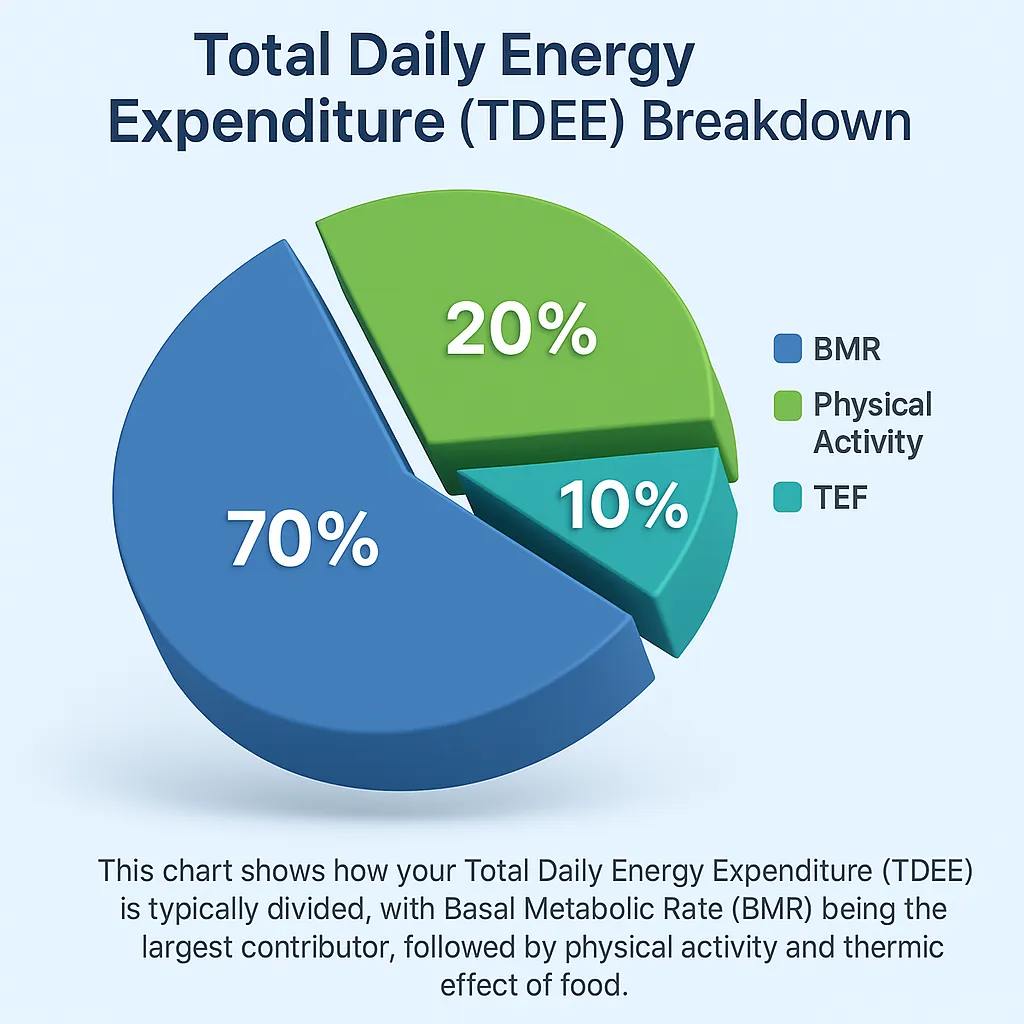
Basic Jobs Powered by Your BMR
| Job | What it Means | Energy Need |
|---|---|---|
| Breathing | Getting air in and out | All Day |
| Blood Flow | Heart pumping blood around | All Day |
| Body Temperature | Keeping your body at the right temp | All Day |
| Cell Work | Building, fixing, and maintaining cells | All Day |
| Brain & Nerve Power | Sending signals, thinking | All Day |
| Basic Muscle Tension | Keeping muscles ready | All Day |
Why BMR Matters
Understanding your BMR isn’t just interesting trivia; it’s super useful for your health planning and managing your daily calorie use:
⦿ Know Your Numbers: It gives you a personal calorie starting point, much better than generic advice.
⦿ Smarter Weight Goals: It’s the foundation for planning weight loss (using a bmr calculator lose weight approach), maintenance, or even muscle gain.
⦿ Plan Your Diet: It helps you understand your body’s basic daily caloric needs before you add in calories burned from activity.
What Affects BMR?
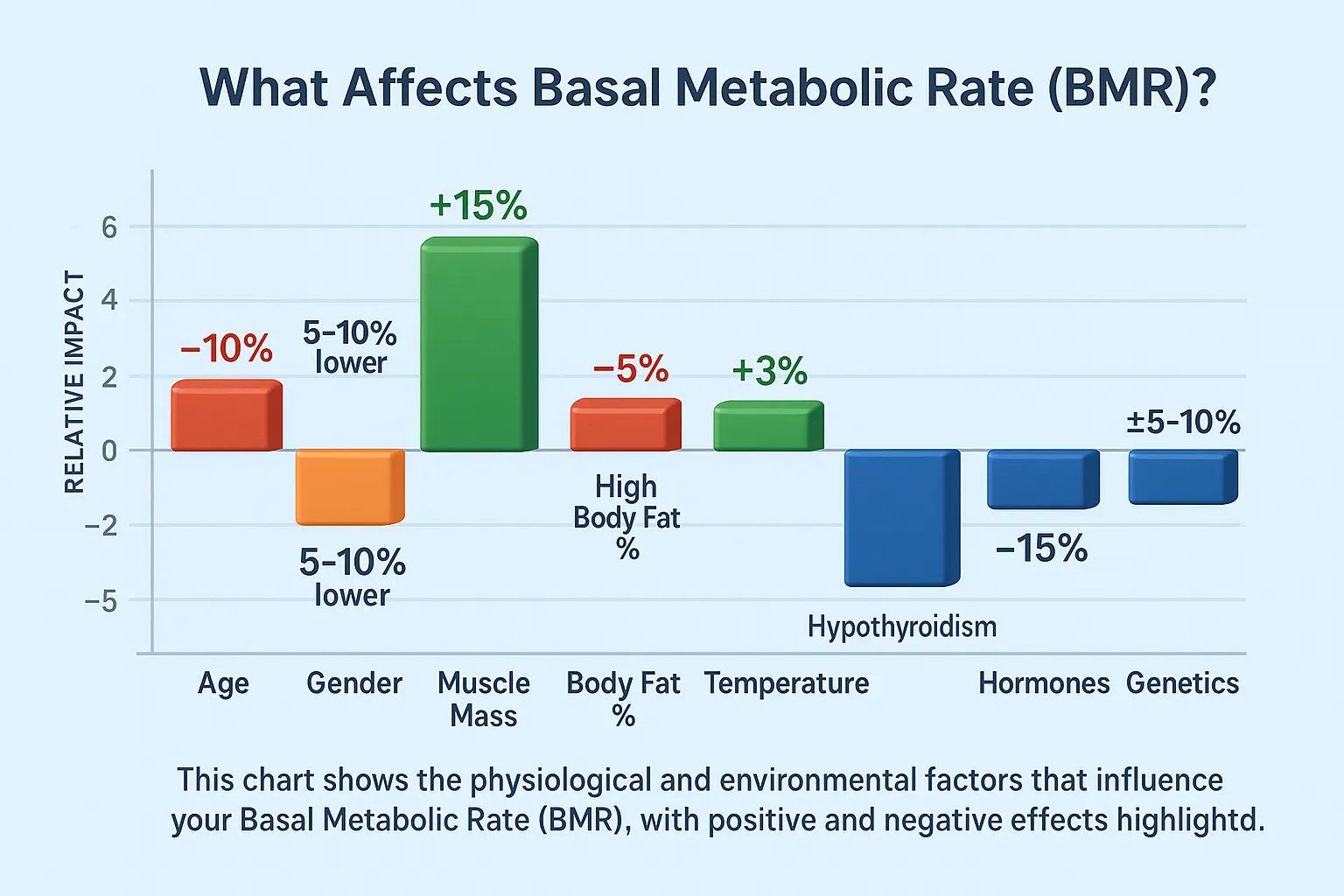
- Muscle
- Age
- Gender
- Body Size/Weight
- Body Fat Percentage
- Genetics
- Hormones
- Temperature
- Being Sick
- Your Diet
Very low-calorie diets for a long time can slow down your BMR.
Many internal and external factors influence your BMR, either increasing or decreasing it over time. The table below explains how each factor typically affects BMR, along with a simple reason.
| Factor | How it Usually Affects BMR | Simple Explanation |
|---|---|---|
| More Muscle | Goes Up | Muscle burns more calories than fat |
| More Body Fat | Goes Up Slightly | Fat burns fewer calories than muscle |
| Getting Older | Goes Down | Often related to losing muscle |
| Being Male | Usually Higher | Due to average size/muscle differences |
| Being Bigger | Goes Up | More body to maintain |
| Fever/Sickness | Goes Up | Body is working hard to heal/fight |
| Crash Dieting | Goes Down | Body tries to save energy |
| Low Thyroid | Goes Down | Less thyroid hormone slows things down |
| High Thyroid | Goes Up | More thyroid hormone speeds things up |
| Genes | Varies | Your natural tendency |
How to Estimate Your BMR: Common Formulas
Getting your BMR measured perfectly needs special lab gear (sometimes people search for bmr calculator machine, but it’s usually just a calculation). For everyday use, we use math formulas in online BMR calculators. Here are the popular ones:
Many experts think this is the bmr calculator most accurate one for most people today.
⦿ For Men: BMR = (10 × weight in kg) + (6.25 × height in cm) – (5 × age) + 5
⦿ For Women: BMR = (10 × weight in kg) + (6.25 × height in cm) – (5 × age) – 161
An older formula that’s still used sometimes.
⦿ For Men: BMR = (13.397 × weight in kg) + (4.799 × height in cm) – (5.677 × age) + 88.362
⦿ For Women: BMR = (9.247 × weight in kg) + (3.098 × height in cm) – (4.330 × age) + 447.593
This one is different because it uses your Lean Body Mass (your weight minus fat). It can be very accurate if you know your body fat percentage correctly. You’d need a bmr calculator with body fat percentage.
⦿ BMR = 370 + (21.6 × Lean Body Mass in kg)
To use any bmr calculator formula, you need your weight (often bmr calculator kg), height (in cm), and age. A quick bmr calculation example using Mifflin-St Jeor for a 35-year-old woman who is 165cm tall and weighs 60kg: BMR = (1060) + (6.25165) – (5*35) – 161 = 600 + 1031.25 – 175 – 161 ≈ 1295 calories. Many online tools use the bmr calculator mifflin st jeor formula.
- Quick Look at BMR Formulas
| Formula Name | Inputs Required | Best For & Notes |
|---|---|---|
| Mifflin-St Jeor | Weight, Height, Age, Sex | Best for most people. Common in online calculators. |
| Revised Harris-Benedict | Weight, Height, Age, Sex | Suitable for most. Slightly less accurate than newer formulas. |
| Katch-McArdle | Weight & Body Fat % | Great for lean/muscular individuals. Needs accurate fat % data. |
BMR vs. TDEE
⦿ TDEE (Total Daily Energy Expenditure): The total number of calories you burn all day long. This includes your BMR plus calories burned digesting food plus all your physical activity (from workouts to walking around).
Finding Your Total Calorie Needs (TDEE) with Activity
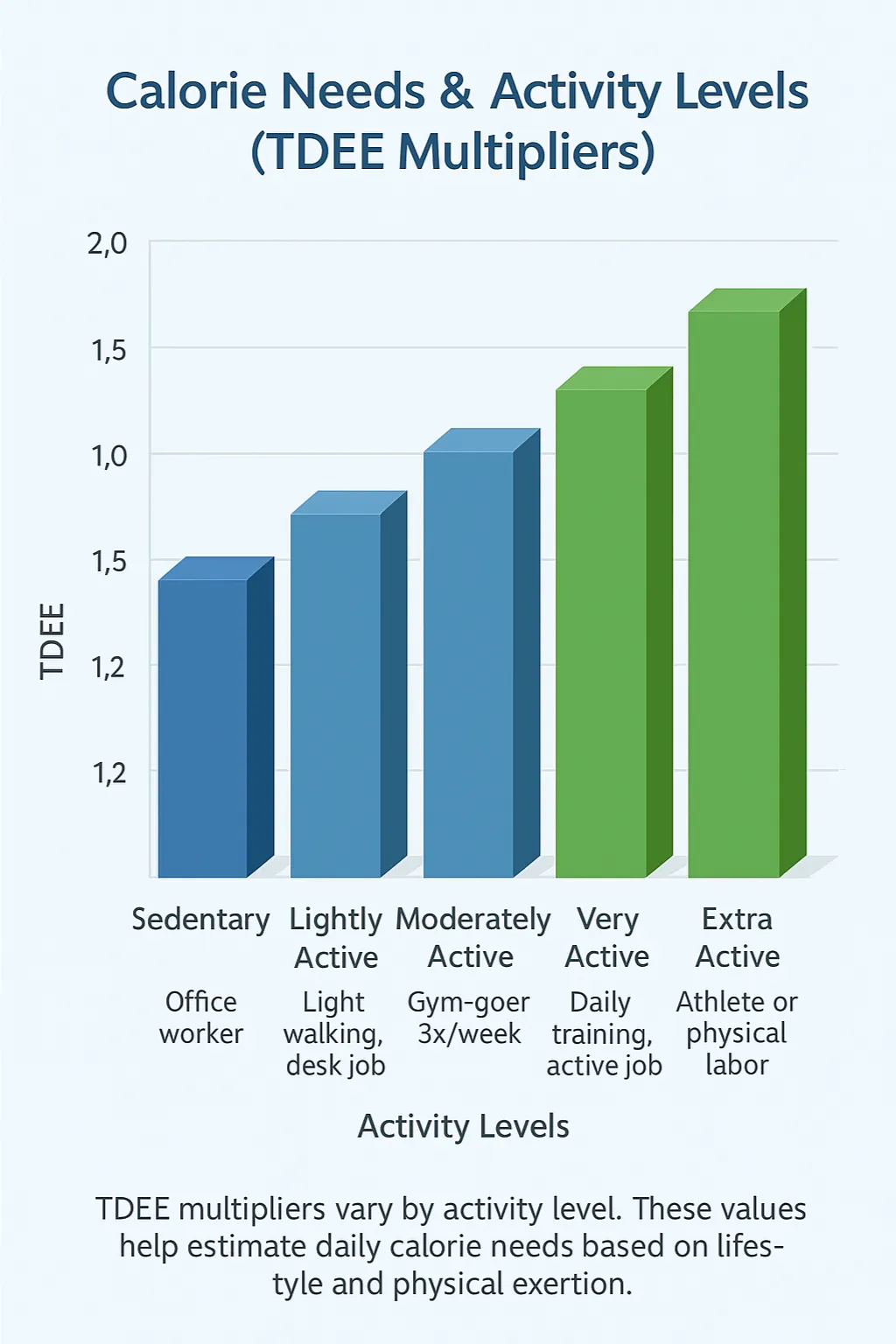
⦿ TDEE = BMR × Activity Factor
| Activity Level | What It Looks Like | Factor & Example (BMR 1400) |
|---|---|---|
| Not Active (Sedentary) | Desk job, very little exercise | 1.2 → 1680 calories |
| Lightly Active | Light exercise or sports 1–3 days/week | 1.375 → 1925 calories |
| Moderately Active | Moderate exercise 3–5 days/week (e.g. gym visits) | 1.55 → 2170 calories |
| Very Active | Hard exercise 6–7 days/week (e.g. regular athlete) | 1.725 → 2415 calories |
| Extremely Active | Daily intense training or physical job | 1.9 → 2660 calories |
Using BMR for Weight Goals
⦿ To Lose Weight: You need a calorie deficit. This means eating fewer calories than your TDEE. A common goal is 300-500 calories less per day. This is how a bmr calculator lose weight approach works best. It creates a planned bmr calculator calorie deficit. A calorie calculator deficit tool helps find this number.
⦿ To Maintain Weight: Aim to eat around your TDEE number each day.
⦿ To Gain Weight (Muscle/Mass): You need a calorie surplus. This means eating more calories than your TDEE. Aim for about 250-500 extra calories per day. This is key for bmr calculator gain weight, bmr calculator weight gain, or using a bmr calculator for muscle gain, always combined with strength training.
Role of Muscle Mass
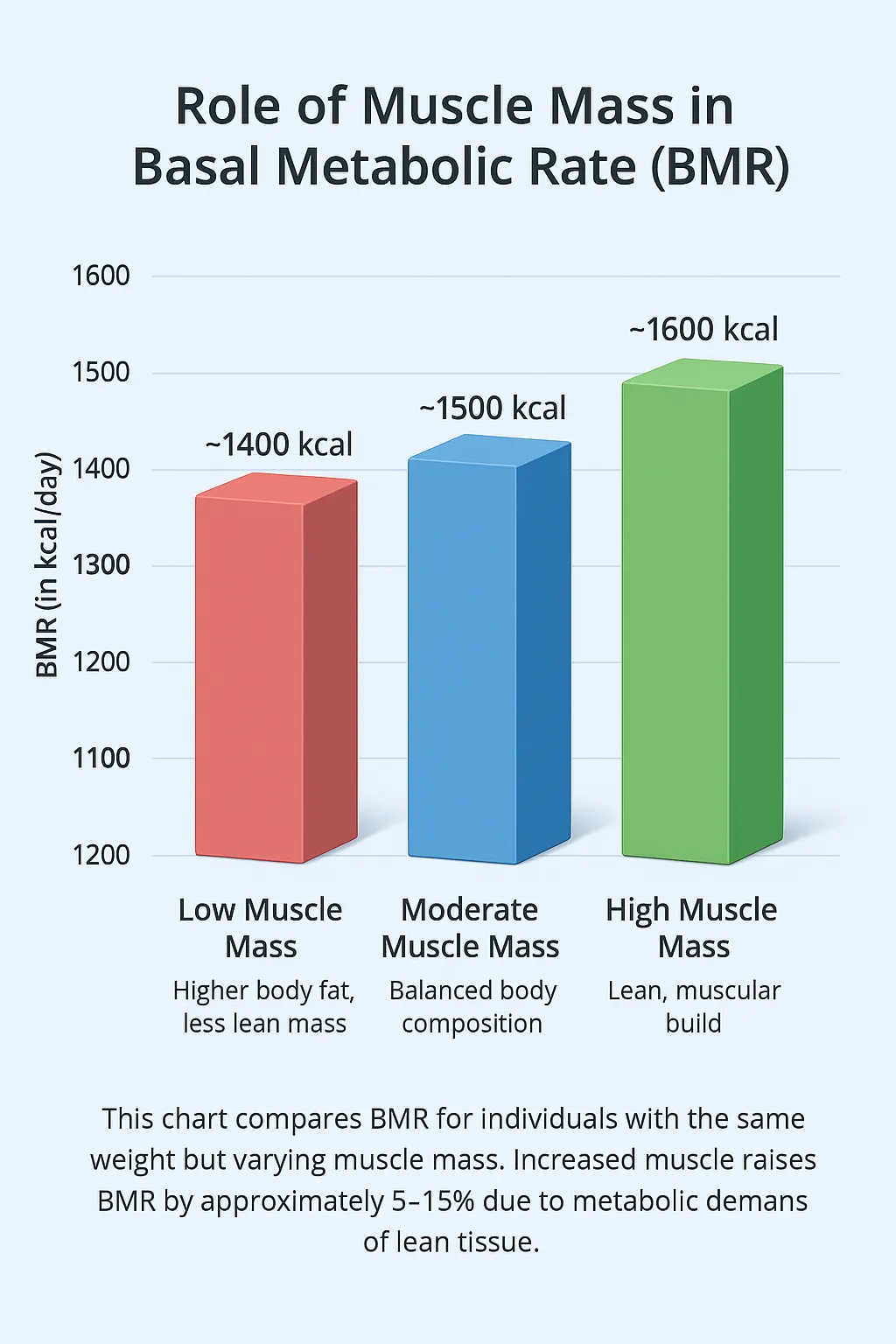
⦿ Boosts Your Resting Burn: More muscle means you burn more calories all day long, even when you’re just sitting around.
⦿ Changes Your Body Shape: More muscle and less fat looks and feels different.
⦿ Makes Weight Management Easier: A higher BMR gives you a little more wiggle room with calories.
Planning What You Eat (Calorie Intake)
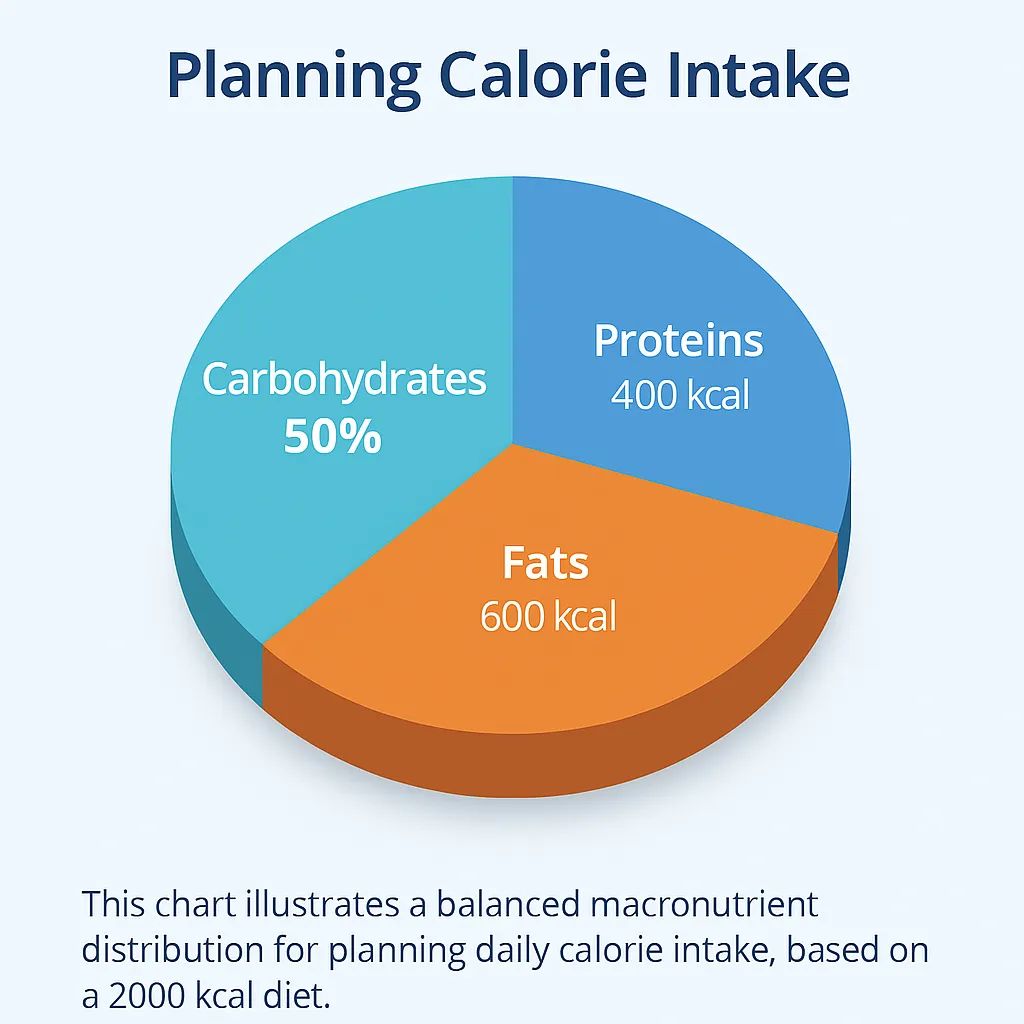
⦿ Protein: Important for building and repairing muscles, helps you feel full, and actually takes a bit more energy to digest. Get enough, especially if you’re active.
⦿ Carbs: Your body’s main fuel, especially for exercise. Choose whole grains, fruits, and veggies most often.
⦿ Fats: Needed for hormones and absorbing certain vitamins. Focus on healthy fats like those in avocados, nuts, seeds, and olive oil.
Is Eating Less Than Your BMR Ever Okay?
- Slower Metabolism: Your body might panic and slow down your BMR to save energy.
- Losing Muscle: Your body might break down muscle for fuel – not what you want!
- Not Enough Nutrients: It's hard to get all the vitamins and minerals you need from very little food.
- Feeling Tired & Weak: Not enough energy to live your life!
- Hormone Problems: Can mess with important hormones.
Lifestyle Factors Impacting BMR
Little things in your daily life can also nudge your metabolism:
⦿ Stress: Being stressed out all the time can affect hormones that influence metabolism.
⦿ Sleep: Not getting enough good sleep can slow metabolism and mess with hunger signals.
⦿ What You Eat: Getting enough protein helps support muscle.
⦿ Being Sick: Your body uses more energy when fighting off bugs.
⦿ Medicines: Some medications can slightly speed up or slow down metabolism (ask your doctor).
How Your BMR Can Change Over Your Life
Your BMR isn’t the same forever:
⦿ Getting Older: It often slowly decreases, mainly if muscle mass isn’t kept up with strength training.
⦿ Losing Weight: When you weigh less, your body needs fewer calories to maintain itself, so BMR usually drops.
⦿ Gaining Weight: More body mass (muscle or fat) generally means a higher BMR.
⦿ Health Issues: Things like thyroid problems can make a big difference.
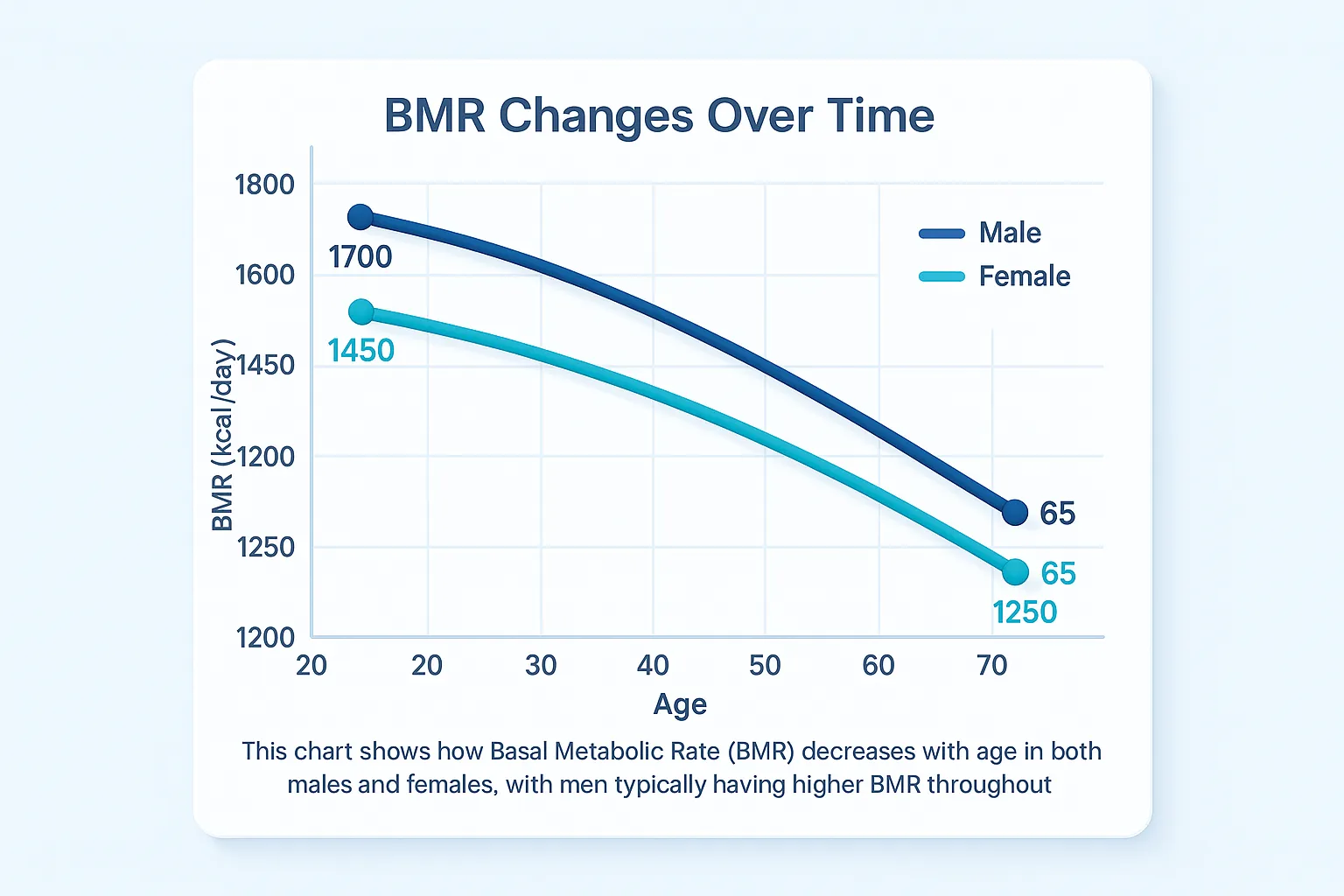
How to Increase BMR Naturally
You can’t change your genes, but you can help your metabolism work efficiently:
⦿ Build Muscle: Do strength training regularly (weights, bodyweight exercises). This is the best way!
⦿ Eat Enough Protein: Helps keep and build muscle.
⦿ Move More All Day: Take stairs, walk around, stand up often (this is called NEAT). It adds to your TDEE and keeps things active.
⦿ Get Good Sleep: Aim for 7-9 hours.
⦿ Don’t Crash Diet: Avoid super low calories for long periods.
⦿ Drink Water: Your body needs water for everything, including metabolism.
BMR vs. RMR
⦿ BMR: Measured in a very strict lab setting (after fasting, totally rested, comfy temperature). It’s the lowest possible resting burn.
⦿ RMR: Measured under less strict conditions (just resting, maybe not fully fasted). It includes tiny amounts of energy used for things like recent digestion, so it’s usually about 10% higher than BMR.
- BMR vs. RMR - Quick Comparison
| Feature | BMR (Basal Metabolic Rate) | RMR (Resting Metabolic Rate) |
|---|---|---|
| How Measured? | Super Strict Lab Conditions | Less Strict, Relaxed Conditions |
| What's Burned? | Absolute Minimum Resting Calories | Resting Calories + Tiny Extras |
| Typical Value? | A Bit Lower | A Bit Higher (about 10%) than BMR |
| Best Use? | Science Baseline | Good Estimate for Daily Planning |
BMR vs. BMI
⦿ BMR: Tells you your calorie burn rate when resting.
⦿ BMI: Tells you about your body size based on your height and weight. It’s a simple screening tool for weight categories but doesn’t say anything about your metabolism or how much muscle vs. fat you have.
Frequently Asked Questions
How often should I figure out my BMR again?
Use a BMR calculator again if your weight changes a good bit (like 10 lbs / 5 kg or more), if your activity level really changes (check the bmr calculator active setting!), or if your health changes. If things are stable, checking once every 6-12 months is fine.
Can supplements really boost my BMR?
Some things like caffeine might give you a tiny, temporary boost in calorie burning. But no supplement will magically change your BMR in a big or lasting way. Real food, exercise, and healthy habits are much more effective. Always be careful with supplements and maybe chat with your doctor.
Why does BMR usually go down as we age?
Is an online BMR calculator accurate?
Are there BMR calculators just for India or in Hindi?
When to Consult a Professional
⦿ If you have health conditions like thyroid issues, PCOS, or diabetes.
⦿ If you have a history of eating disorders.
⦿ If you’re an athlete with very specific needs.
⦿ If you’re trying hard but not seeing results.
⦿ If you want a detailed eating plan made just for you by a Registered Dietitian or qualified nutritionist.
⦿ If you have health conditions like thyroid issues, PCOS, or diabetes.
⦿ If you have a history of eating disorders.
⦿ If you’re an athlete with very specific needs.
⦿ If you’re trying hard but not seeing results.
⦿ If you want a detailed eating plan made just for you by a Registered Dietitian or qualified nutritionist.
Take Control of Your Body's Energy Needs!

Dr. Harsh Shah
MS, MCh (G I cancer Surgeon)
Dr Harsh Shah is a well known GI & HPB Robotic Cancer Surgeon in ahmedabad. He treats cancers of esophagus, stomach, liver, pancreas, colon, rectum & small intestines. He is available at Apollo Hospital.

